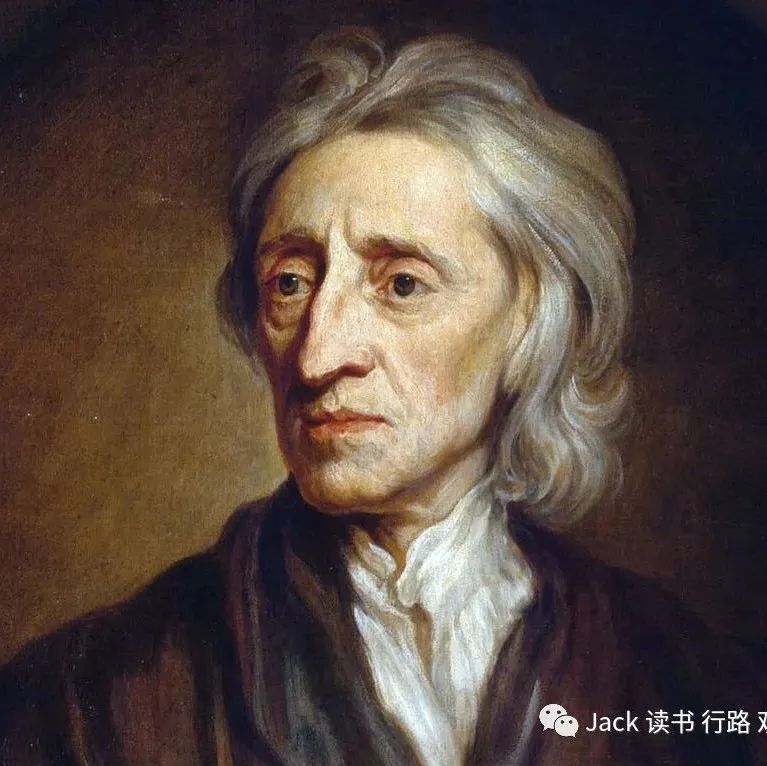Links Between East and West 14 The Natural Laws 东西方的连接14 - 自然法
From the past to the present, with the arising of villages, towns, and vast cities, Homo sapiens have always tried to form new, more complex social structures. These artificial structures cannot always be perfect, and the defects always cause grave problems that can be devastating. For example, the constant warring between the seven Chinese states during the Spring and Autumn, then the Warring States Period caused the loss of lives in horrific numbers; the collapse of Athenian democracy after Pericles died during the Peloponnesian War led to the sudden, ultimate decline of the Athenian Empire; the collapse of the monarchical Roman Empire led to the emergence of a dark age that would last for a thousand years; and the continuous civil wars in the 17th century in Britain between different factions, between the Crown and the Parliament caused a political catastrophe that would take years to amend. However, from my point of view, it is exactly during and after these periods of the breakdown of political systems that the thinkers of history contemplated the source of the issue and tried to rebuild a better system. The Chinese Emperor Wen of the Han Dynasty, after years of warfare and massacre, followed the path of nature and proposed ruling policies based on rehabilitation. Aristotle wrote Politics to attempt to save the rapid decline of Athens. Saint Augustine created masterpieces such as The City of God to show the inner illnesses of the Roman Empire, and offer a potential way out of the dilemma. Thomas Hobbes and John Locke addressed the intrinsic problems that lie after the English Civil Wars from 1642-1651 with works like The Leviathan and The Two Treatises of Government. In all of these writings that aim to salvage ruining sovereignty, the brilliant minds always explored and observed inwards to our human nature to seek a solution, as they believe nature has the answer. Here is when the concept of “natural law” emerges, as they have the mission to assist in reconstructing a societal or political structure. A “natural law” is a rule derived directly from human nature, and based on values and moral rules fundamental to humanity that can be observed in our daily lives. These special laws guide us on morality, proper behavior, and on developments in society. They can be used to reflect reality and see the underlying issues in an artificial scheme in a lucid manner.
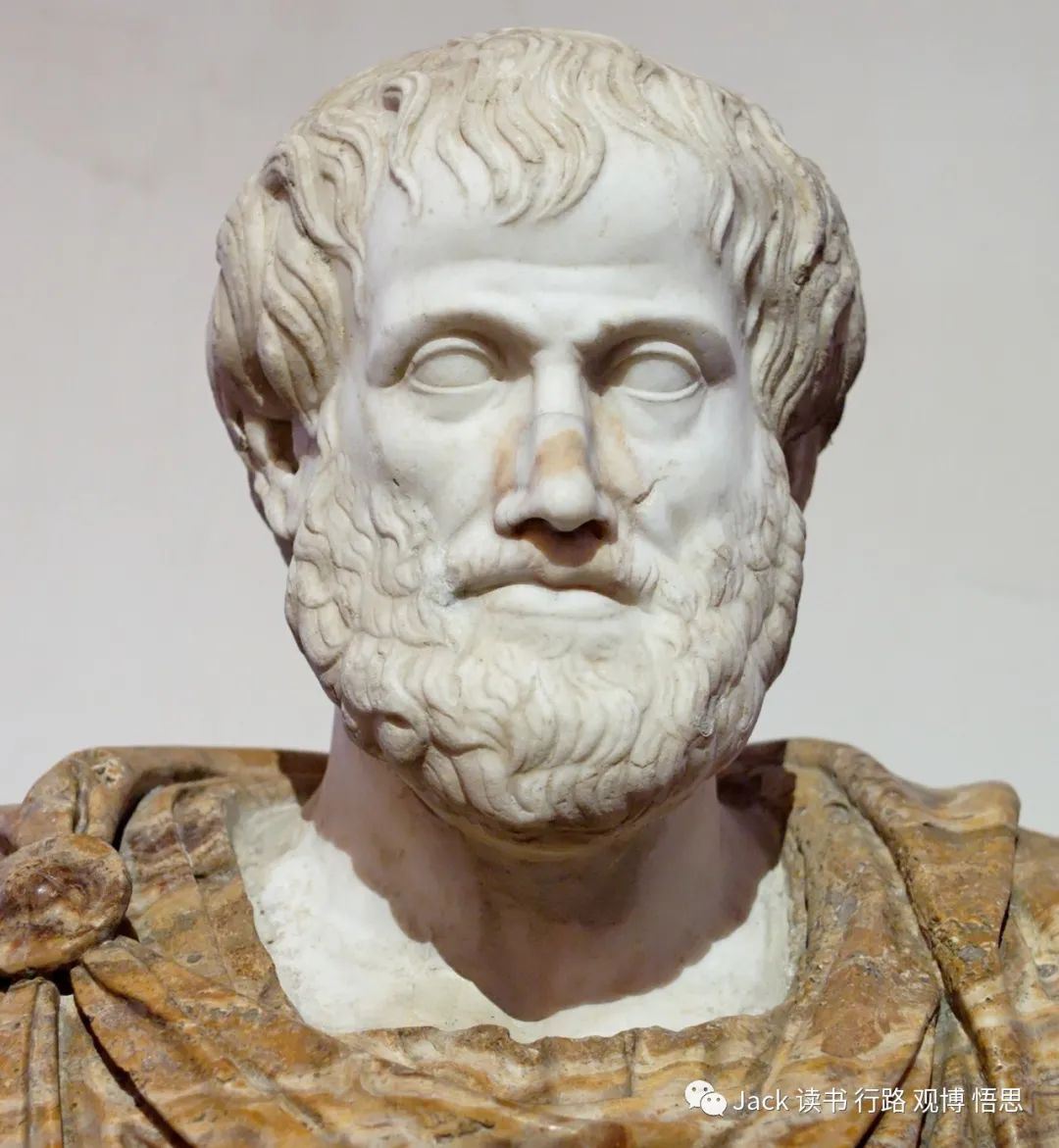
(Bust of Aristotle)
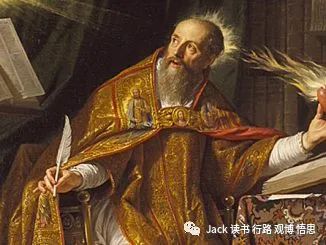
(Painting of St. Augustine of Hippo)
In the Western Hemisphere, during the classical age, the idea of “natural law” already existed. Aristotle, more than 2300 years ago, claimed that there was a natural justice everywhere with the same force and “not existing by people thinking this and that”. Additionally, he reasoned that what was “just by nature” was not usually “just by law”, identifying “natural laws” and “human laws” as distinct systems of rules and guidelines. By pointing out the existence of natural rules, Aristotle tried to restore a sense of natural justice as well as morality to the degenerating Athenian Empire. More than 700 years later, at the brink of the demise of the Western Roman Empire and consequentially the classical Western world, Saint Augustine would borrow “natural laws” again, this time with the combination of Christian views, to reveal the ailments within the Roman Empire and design a possible better system. Augustine argued that there is an “eternal law” that is inscribed into everyone created by the creator or God. The “eternal law” is God’s perfect plan for the world, and it instructs every organism on its moral and social behaviors. By constructing this system of laws, St. Augustine was able to diagnose the moral and spiritual issues with the dogmas of traditional Roman religion, and reason how that caused the decay of decency in the Romans.
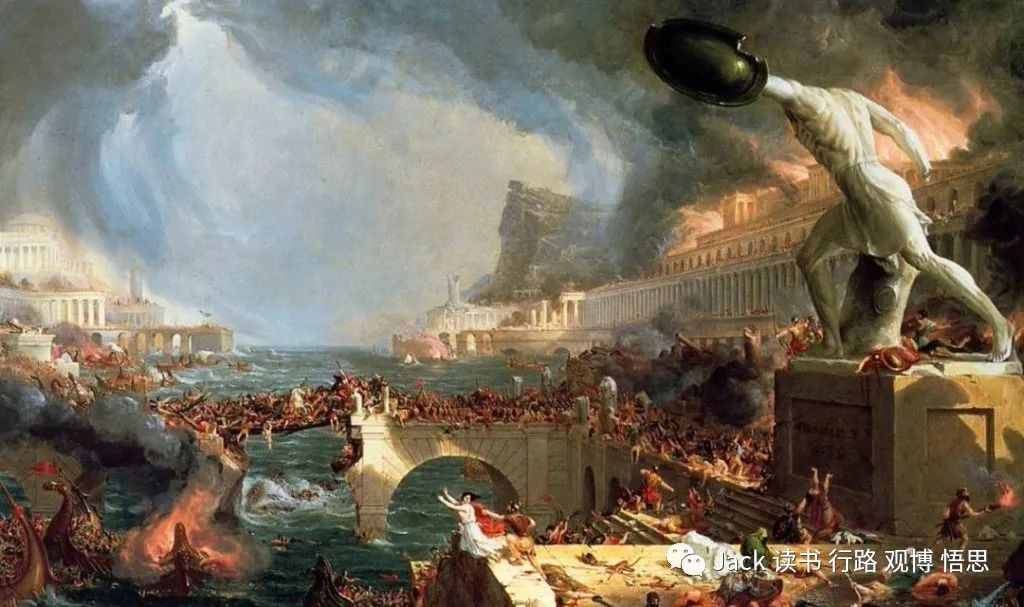
(Painting of the fall of the Western Roman Empire)
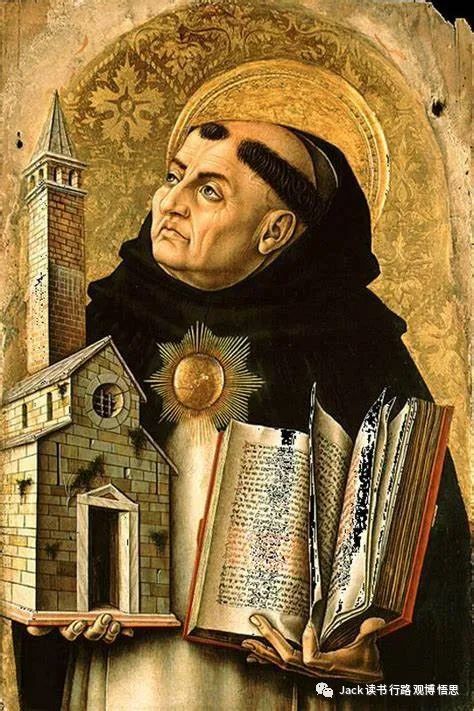
(Painting of St. Thomas Aquinas)
With the fall of the Western Roman Empire in 476 C.E., Europe entered the Middle Ages. We always refer to the Middle Age as a dark age when the light of civilization faded away. However, this reference is not totally true. During this period of time, Christianity reached the apex of its power and was able to influence classical ideas about natural law. The Middle Age is exactly when St. Thomas Aquinas was born. St. Thomas Aquinas can be regarded as the founding thinker of a systematic set of theories about natural laws. He combined the thoughts of classical philosophers and lawgivers with Christian beliefs and doctrines mentioned in The Bible. Aquinas divided the realm of law and rules into four sections. The first is the “eternal law”, which has a definition and purpose similar to that devised by St. Augustine. The “eternal law” is the premium model God has created for the world; it is a direct representation of the orders of nature. The second section is the “natural law”. Aquinas reasoned that the “natural law” is a branch of the “eternal law” that is inscribed into the hearts of every one of the created. Aquinas claimed that the purpose of the “natural law” is to give people the power to distinguish between good and evil, between what is right and what is wrong. He stated, “the light of reason is placed by nature [and thus by God] in every man to guide him in his acts”. The third type of law is called the “human law”. The “human law” is a set of artificial rules produced by people themselves. The rules should be derived from the natural laws and should be used to punish any evilness that is displayed. Finally, the “divine law” is another part of the “eternal law”, and it is not the product of logical reasoning but rather of inspiration from supernatural power. Overall, Aquinas’ classification of the laws in the world, including “natural laws”, would be the foundation for the development of modern-day views of what “natural law” is.
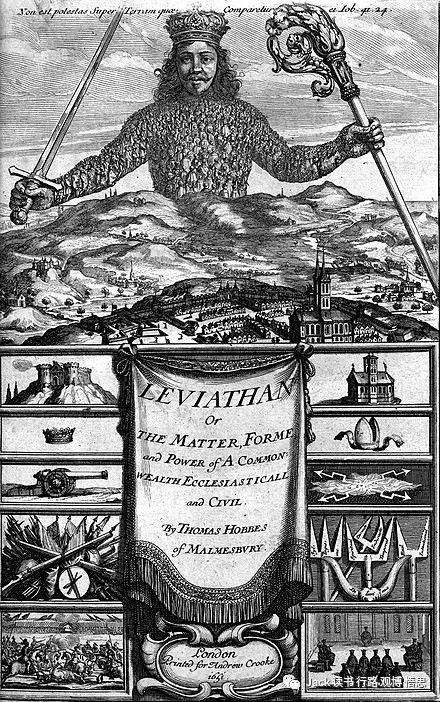
(The illustrations on the title page of The Leviathan)
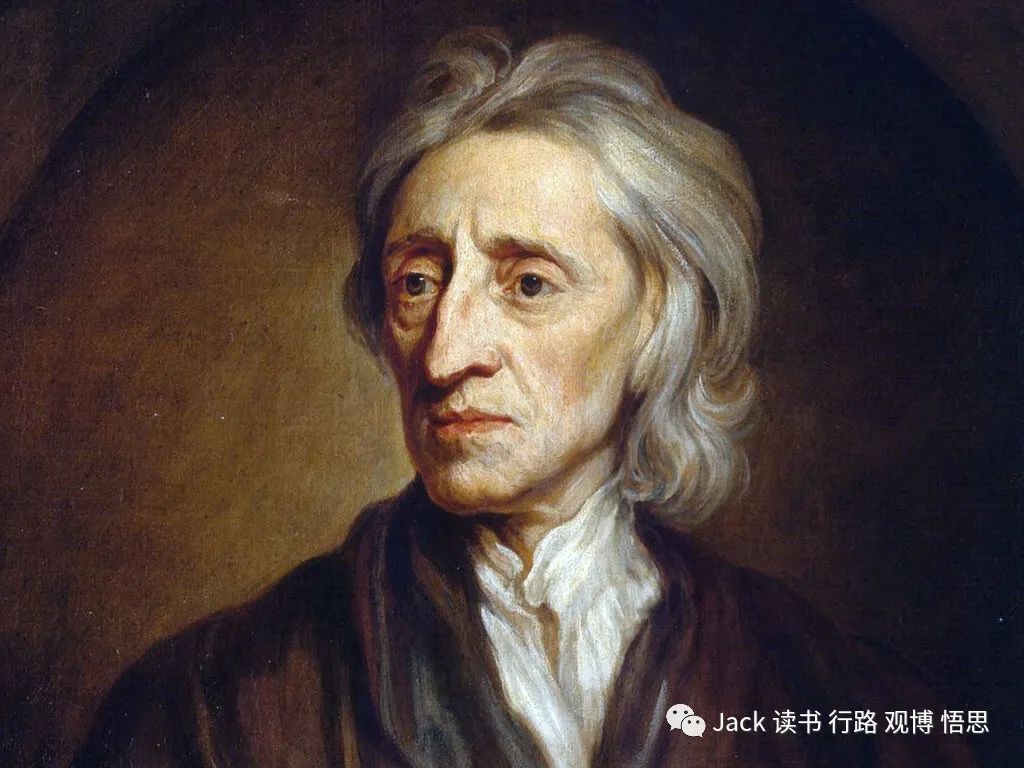
(Painting of John Locke)
After the Middle Ages passed with the fall of Constantinople in 1453, Europe experienced a sudden surge of novel views on the world and on humankind. In the 17th century, to try and resurrect England from a series of civil wars between the Crown and the Parliament, Thomas Hobbes, one of the greatest thinkers in the history of England, wrote The Leviathan. In this political masterpiece, Hobbes provided a thorough analysis and construction of what “natural law” is under his opinion. Hobbes, after looking at human nature thoroughly, concluded that natural law can only exist when people reach a point of agreement through logical thinking that is in their own self-interest. In a natural state, humans will only care for themselves, and their greed will force them to declare war against another. The “natural law” is a “precept or general rule [that] is found out by reason”, and its tenet is that everyone has the obligation to protect or preserve themselves. John Locke more or less inherited Hobbes’ views. In Locke’s reasoning, under a natural state, although there is no overarching monarch, it is still not a totally free state, and there are still natural laws governing. Locke believed that a “natural law” is a law that everybody can discover and observe with their own human nature. He set it as a premise for all of their obligations. Both Hobbes and Locke argued that natural law is a type of rule that is only discoverable via logical reasoning and the attributes of a preexisting human nature. Based on such arguments, they built new governments on paper that emphasize the relationship between the individual and the state during the flourishing Age of Enlightenment.
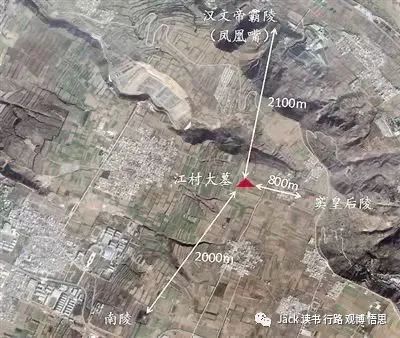
(The location of the recently discovered tomb of Emperor Wen)
In the Eastern Hemisphere, ancient China has a history of feudalism and absolute monarchy for more than 2000 years. But during some periods, the idea of “natural law” sprouted and even took firm root in its governmental policies. One such period was when Emperor Wen of the Han Dynasty took power. Before Emperor Wen, China experienced hundreds of years of warfare and the brutal, totalitarian Qin Dynasty. The common people were suffering from long years of suppression and conflict. Whether the Qin political system based on extremely harsh laws seemed to be unfeasible for a long-term, prosperous dynasty, piqued the interest of the ruler of a new dynasty. Emperor Wen, amazingly, decided to reform the legal and political system by allowing more freedom and less cruelty or brutal suppression. He more or less partially at least considered the natural laws, such as that all people crave for stability, all commoners detest violent warfare, all people should be free, or that the positive laws should serve the public in the fairest, most just way, taking into account their rights. He made laws significantly less harsh, diminished the power of the emperor partially by separating some of it into the legislative system, and guided the economy to a more liberal way. All these actions had a common aim to create a more natural and less artificial or rigid political, economic structure, to give some breathing room for the exhausted population, and to build strength for prosperity. His reforms proved massively successful, and he and his successor constituted a small golden age. Emperor’s Wen example with the reference and implementation of the natural laws proved that when artificial systems started to break down, one of the ways to fix the problem would simply be to make it more natural by looking into the ways humans and nature work.
Overall, across the globe, natural laws were discovered and thoroughly theorized, sometimes even implemented or integrated into artificial systems, through history. The concept of “natural laws” naturally leads to another very relevant concept, which is “spontaneous order”. From my point of view, natural law came before spontaneous order. Natural laws existed in the most primitive human state since these laws could only be found by using the most natural or primitive human sense and logic. Spontaneous order, on the other hand, describes a process whereby social orders and contracts would naturally start to form if people were left in a natural state. In other words, the natural state governed by natural laws would turn into more complicated societies via spontaneous order. The latter concept, in particular, has been discussed massively ever since the 20th century. Some basic theories about spontaneous order could have originated from the Spring and Autumn Period in Chinese history. The Chinese philosopher Lao Zi claimed that personal freedom, rights, and happiness should be the primary goals of a society. He believed that the ruling administration that enacted so many laws is natural repression on the individual, and is more fearsome than even death. Zhuang Zi followed Lao Zi’s line of thought, and more systematically reasoned that in a natural state, by following natural patterns of human behavior, a more functional system of orders would be created. More than two thousand years later, Western theorists and scholars like Fredrich Hayek in the 20th century have continued to champion this “spontaneous order” concept, arguing that the best rules are the most natural ones and that governments should play no role in controlling the economic structure. These arguments centered around natural laws and spontaneous order mean so much for the increasingly human-dominated world today. History has taught us that artificial systems cannot be perfect, and would eventually go to their own doom, no matter how glorious it had been. Only a system that takes into account our human nature and the natural patterns in human societies has the chance to endure through and ultimately achieve long-term, sustainable prosperity.
WORKS CITED
Britannica, The Editors of Encyclopaedia. "Natural law." Encyclopedia
Britannica, 13 Aug. 2019, https://www.britannica.com/topic/natural-law.
Accessed 16 June 2021.
Hobbes, Thomas. Leviathan: Volume One. United States, Pacific Publishing Studio,
2011.
Locke, John. Two Treatises of Government. Whitefish, Kessinger Publishing, 1988.
PICTURES CITED
https://www.universetoday.com/145029/who-was-aristotle/
https://www.catholicworldreport.com/2019/03/12/yours-is-the-wisdom-pagans-doctors-and-fathers/
https://www.stephenhicks.org/2015/11/14/st-thomas-aquinas-on-whether-sinners-should-be-killed-or-heretics-tolerated/
https://www.alamy.com/stock-photo-thomas-hobbes-title-page-of-leviathan-1652-english-moral-and-political-83367004.html
http://www.danilobreschi.com/2016/05/24/john-locke/comment-page-1/
https://wappass.baidu.com/static/captcha/tuxing.html?ak=572be823e2f50ea759a616c060d6b9f1&backurl=https%3A%2F%2Fmbd.baidu.com%2Fnewspage%2Fdata%2Flandingsuper%3Fthird%3Dbaijiahao%26baijiahao_id%3D1719190783263622489%26c_source%3Dkunlun×tamp=1643105932&signature=921de516f639c1d8d65a404c43f982d5
从过去到现在,随着村庄、城镇和城市的出现,智人总是试图形成新的、更复杂的社会结构。这些人工结构不可能总是完美的,而缺陷总是造成严重的,甚至毁灭性的影响。例如,古代中国春秋战国持续几百年的战乱及秦朝残酷的集权统治所造成的生灵涂炭;伯罗奔尼撒战争中伯里克利死后,雅典民主制度的崩溃导致了雅典帝国的突然的衰落;公园476年,君主制西罗马帝国的崩溃导致了一个持续大约一千年的中世纪;17世纪英国不同党派、王室与国家议会之间的持续内战造成了一场需要多年才能弥补的政治灾难。然而,在我看来,正是在这些政治制度崩溃时与崩溃之后,历史上的思想家们才真正思考了问题的根源,并试图重建一个更好的制度。中国汉朝的统治者汉文帝在民众经历了几百年的动乱和暴政后,遵循自然之道,提出了“休养生息”的执政策略;亚里士多德写了《政治学》,试图挽救民主雅典的迅速衰落;圣奥古斯丁创作了《上帝之城》等杰作,展示了罗马帝国的内在病症,并提供了摆脱困境的潜在途径;托马斯-霍布斯和约翰-洛克通过《利维坦》和《政府两论》等作品解决了1642-1651年英国内战后的内在政治制度问题。在所有这些旨在挽救的著作中,这些杰出的头脑总是向内探索和观察我们的人性,以寻求解决方案,因为他们相信自然界总有答案。这时,"自然法 "的概念出现了,它们的任务就是协助重建社会或政治结构。 "自然法 "是直接来自于人类本性的规则,它的基石在于我们日常生活中可以自然观察到的人类基本价值观与道德行为准则。这些特殊的法律在道德、适当的行为以及在社会发展方面为我们所有人提供指导。它们可以用来反映现实,并以一种清晰的方式揭示人工制度之下的根本问题。

(亚里士多德头部雕塑)
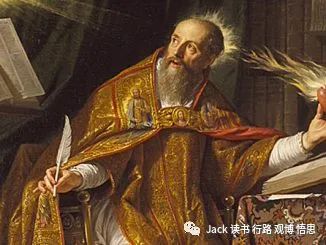
(西波的圣奥古斯丁画像)
西方半球的古典时代,"自然法 "的概念已经存在。2300多年前,亚里士多德声称,到处都有一种具有同样力量的“自然正义”。这种正义"不是靠人们想这想那而存在",是一种自然秩序。此外,他还推断,"自然的公正 "通常不是 "法律的公正",将 "自然法 "和 "人类法律 "确定为不同的规则和指导体系。通过指出自然规则的存在,亚里士多德试图为精神堕落的雅典帝国恢复一种自然正义和道德感,从而使民风与政治制度重回正轨。700多年后,在西罗马帝国乃至西方古典世界的灭亡边缘,圣奥古斯丁将再次借用 "自然法则",这次是与基督教观点相结合,以揭示罗马帝国内部的严重病源,并设计一个可能的更好的系统。奥古斯丁认为,有一个 "永恒的法则",被创造者或上帝刻在每一个被造物中。这条 "永恒的法则 "是上帝对世界的完美计划,它指示每个有机体的道德和社会行为。通过构建这个法律体系,圣奥古斯丁努力诊断出罗马人原本宗教的种种漏洞,并探讨这是如何导致罗马人的道德和精神层面出现沦丧。

(公园476年西罗马帝国的毁灭)
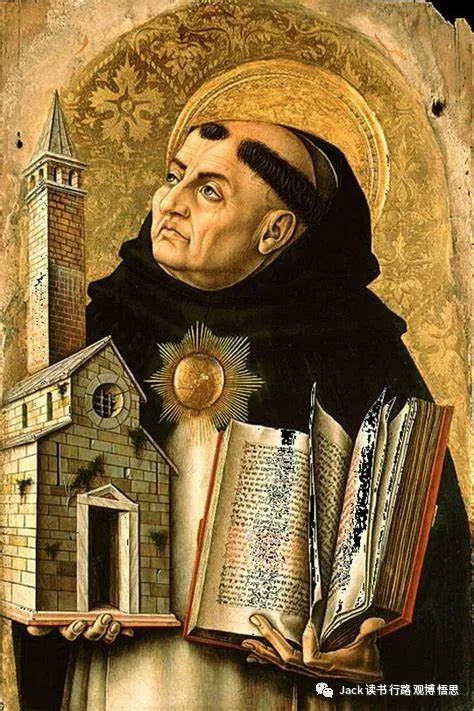
(圣托马斯阿奎那画像)
随着公元476年西罗马帝国的灭亡,欧洲进入了中世纪。我们总是把中世纪称为文明之光逐渐消失的黑暗时代。然而,这种提法并不完全正确。在这一时期,基督教达到了其力量的顶点,并能够影响关于自然法的古典时期的思想。中世纪正是圣托马斯-阿奎那出生的时候。圣托马斯-阿奎那可以被认为是一套系统的自然法理论的创始思想家。他将古典哲学家和法学家的思想与《圣经》中提到的基督教信仰和教义相结合。阿奎那将法律和规则的领域分为四个部分。第一部分是 "永恒的法律",它的定义和目的与圣奥古斯丁的类似。永恒的法律 "是上帝为世界创造的高级模式;它是自然秩序的直接代表。第二部分是 "自然法"。阿奎那推断,"自然法 "是 "永恒法 "的一个分支,它被刻在每个被造物的心中。阿奎那声称,"自然法 "的目的是让人们有能力区分善与恶,区分什么是正确的和什么是错误的。他说,"理性之光是由自然[因而也是由上帝]放在每个人身上的,以指导他们的行为"。第三类法律被称为 "人法"。人法 "是一套由人们自己制定的人为规则。这些规则应该来自于自然法则,应该用来惩罚任何表现出来的邪恶行为。最后,"神法 "是 "永恒的法律 "的另一部分,它不是来自逻辑推理的产物,而是来自超自然力量的启发。总的来说,阿奎那对世界上的法律的归类、整理、发挥,包括 "自然法 ",将成为现代人对 "其看法的发展基础。
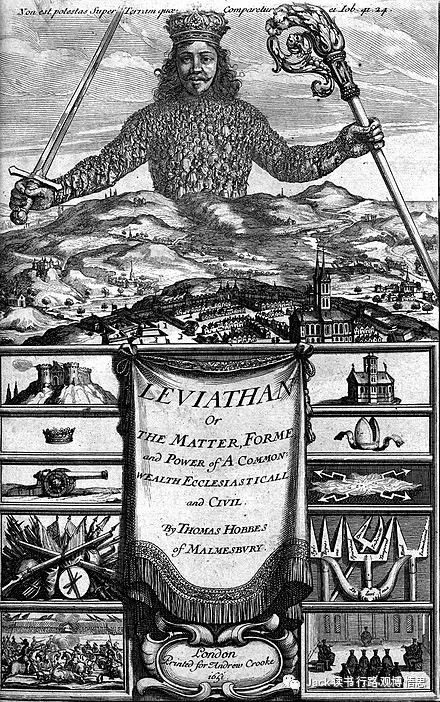
(《利维坦》标题页插画)

(约翰·洛克画像)
中世纪随着1453年君士坦丁堡的陷落而过去后,欧洲经历了一场古典思想和关于世界和人类的新颖的观点的突然涌现。在17世纪,为了试图使英国从王室和议会之间的一系列内战中复活,英国历史上最伟大的思想家之一托马斯-霍布斯写了《利维坦》。在这部政治巨著中,霍布斯对他认为的 "自然法 "进行了彻底的分析和构建。霍布斯在彻底研究了人性之后,认为只有当人们通过理性而达成一致,认为这符合自己的利益时,自然法才能存在,因为在自然状态下,人类只会关心自己,他们的贪婪会迫使他们向他人宣战。"自然法 "是一种 "通过理性发现的戒律或一般规则",其宗旨是每个人都有义务保护或保存自己。约翰-洛克或多或少继承了霍布斯的观点。在洛克的推理中,在自然状态下,虽然没有统领一切的君主,但仍然不是一个完全自由的状态,仍然有自然法则在支配着。洛克认为,"自然法 "是每个人都能以自己的人性发现和遵守的法则,并将其作为自己所有义务的前提。总而言之,霍布斯和洛克认为,自然法是一种只有通过逻辑推理和预先存在的人性的属性才能发现的规则。基于这样的论点,霍布斯和洛克在书中为英国构建了新的政府,提出并强调了个人与国家之间的微妙关系。

(汉文帝“霸陵”遗址处)
在东半球,古代中国有着2000多年的封建史,中国的政治制度是绝对的君主专制。但在一些时期,"自然法 "的思想仍然发芽,甚至在其政府政策中牢固扎根,其中一个时期就是汉文帝掌权的时候。在汉文帝之前,中国经历了春秋战国时期几百年的战乱和秦朝残酷的极权统治,老百姓在长期的战乱和镇压中饱受折磨。以极其严酷的法律为基础的秦制是否有利于一个新王朝的长期繁荣,这引起了一位新朝统治者的思考。令人惊讶的是,这位统治者汉文帝决定改革法律和政治制度,允许更多的相对自由,减少残酷或野蛮的镇压。他思考了治理国家的自然之道,如所有的人都渴望安定,人性中反对残酷的战争,人人都应该是自由的,或者人工法律应该以最公平、最公正的方式为公众服务,他甚至将部分权力分离给立法系统而有效地削弱了皇权,并引导经济走向更自由的方式。所有这些行动都有一个共同的目标,即创造一个更自然、更少受人为控制或僵化的政治、经济结构,给疲惫不堪的人民一些喘息的机会,并为繁荣积蓄力量。事实证明,他的改革取得了巨大的成功,他和他的继任者创造了中国历史中少见的一个小小的黄金时代,即“文景之治”。汉文帝的执政思路事实上是对自然法的参考和实施证明,他的改革启示后来者们,当人工系统开始失败和崩溃时,解决问题的方法之一可以仅仅是寻找天地之间的自然之道。
总的来说,穿越历史,在全球范围内,自然法被发现并被彻底理论化,有时甚至被实施或整合到人工系统中。“自然法"的概念自然地引出另一个非常相关的概念,即 "自发秩序"。从我的观点来看,自然法先于自发秩序出现。自然法只明显存在于人类最原始的状态下,因为这些法则只能通过使用最自然或最原始的人类感觉和逻辑来发现。另一方面,自发秩序描述了一个过程,如果人们被留在自然状态下,社会秩序和契约将自然而然地开始形成。换句话说,受自然法则支配的自然状态会通过自发秩序变成更复杂的社会。特别是后一个概念,自20世纪以来一直被大量讨论,并一度占据政治经济论坛的主导地位。事实上,一些关于自发秩序的基本理论曾惊现于中国历史上的春秋时期。中国哲学家老子声称,维护个人自由、权利和幸福应该是社会的首要目标。他认为,制定了许多法律的统治行政部门是对个人的自然压制,甚至比死亡更令人恐惧。庄子沿袭了老子的思路,更系统地推理出,在自然状态下,通过遵循人类行为的自然模式,将创造出一个更实用、更可行的秩序体系。两千多年后,西方理论家和学者,如20世纪的弗雷德里希-哈耶克,继续倡导这种 "自发秩序 "的概念,认为最好的规则是最自然的规则,政府不应该在控制经济结构中发挥作用。这些以自然法则和自发秩序为中心的论点对于今天这个日益由人类主导的世界来说意义重大。毕竟,历史告诉我们,一个完全人工的系统不可能是完美的,最终会走向自己的末日,无论它曾经多么辉煌。只有考虑到我们的人性和人类社会的自然模式的系统才有机会经受住考验,并最终实现长久的、可持续的繁荣。
- 本文标签: 原创
- 本文链接: http://www.jack-utopia.cn//article/422
- 版权声明: 本文由Jack原创发布,转载请遵循《署名-非商业性使用-相同方式共享 4.0 国际 (CC BY-NC-SA 4.0)》许可协议授权
